Brexit's Impact on Trade and Investment in Commonwealth Countries and UK's Aircraft Sector
VerifiedAdded on 2023/06/11
|15
|4310
|418
AI Summary
This article discusses the impact of Brexit on trade and investment in Commonwealth countries and the UK's aircraft sector. It covers the running key trends of trade between Commonwealth countries, trade statistics, and trading prospects post-Brexit. The article also evaluates the economic, exchange rate, and financial impacts of Brexit on the UK's aircraft sector.
Contribute Materials
Your contribution can guide someone’s learning journey. Share your
documents today.
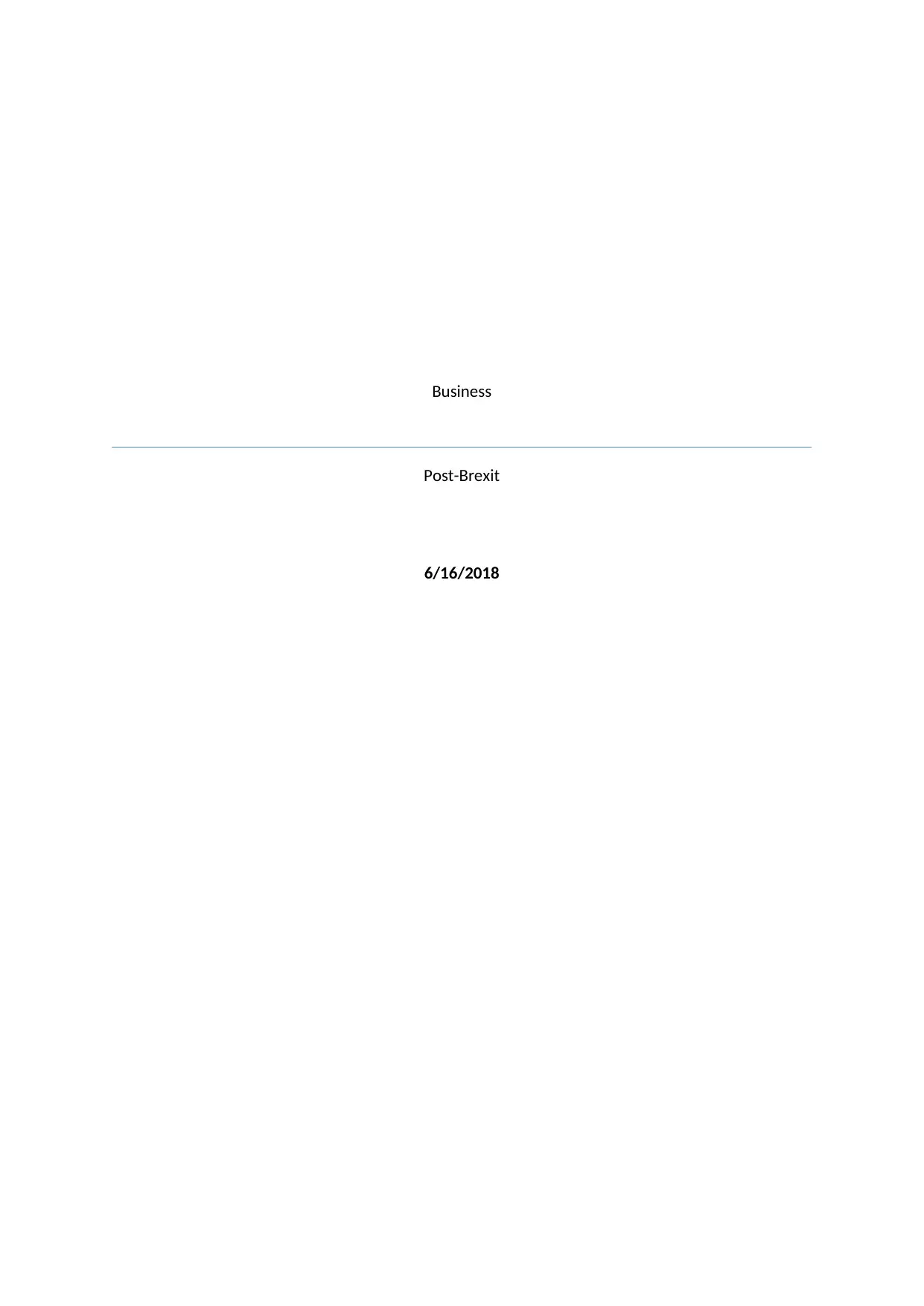
Business
Post-Brexit
6/16/2018
Post-Brexit
6/16/2018
Secure Best Marks with AI Grader
Need help grading? Try our AI Grader for instant feedback on your assignments.
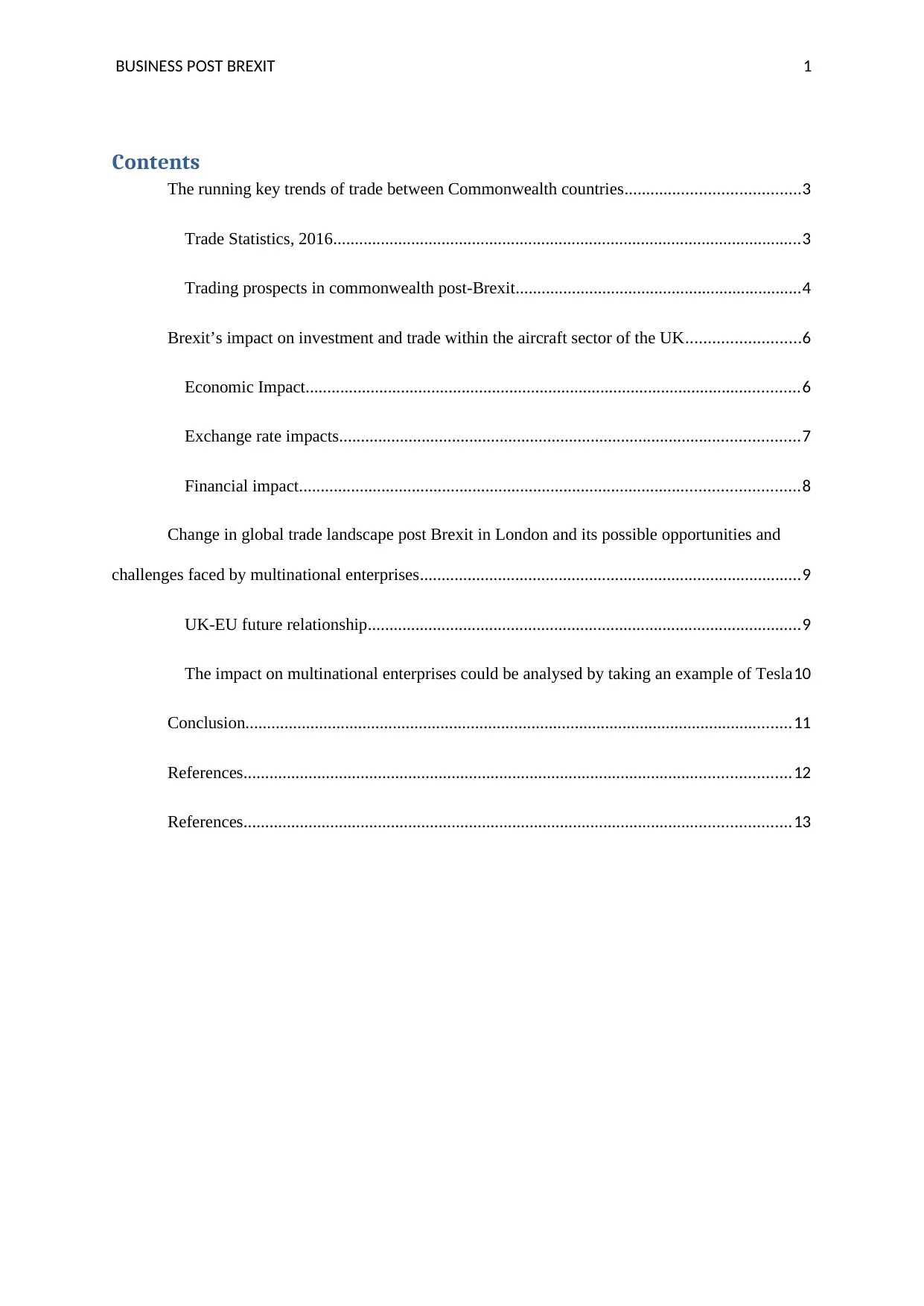
BUSINESS POST BREXIT 1
Contents
The running key trends of trade between Commonwealth countries........................................3
Trade Statistics, 2016............................................................................................................3
Trading prospects in commonwealth post-Brexit..................................................................4
Brexit’s impact on investment and trade within the aircraft sector of the UK..........................6
Economic Impact..................................................................................................................6
Exchange rate impacts..........................................................................................................7
Financial impact...................................................................................................................8
Change in global trade landscape post Brexit in London and its possible opportunities and
challenges faced by multinational enterprises........................................................................................9
UK-EU future relationship....................................................................................................9
The impact on multinational enterprises could be analysed by taking an example of Tesla10
Conclusion..............................................................................................................................11
References..............................................................................................................................12
References..............................................................................................................................13
Contents
The running key trends of trade between Commonwealth countries........................................3
Trade Statistics, 2016............................................................................................................3
Trading prospects in commonwealth post-Brexit..................................................................4
Brexit’s impact on investment and trade within the aircraft sector of the UK..........................6
Economic Impact..................................................................................................................6
Exchange rate impacts..........................................................................................................7
Financial impact...................................................................................................................8
Change in global trade landscape post Brexit in London and its possible opportunities and
challenges faced by multinational enterprises........................................................................................9
UK-EU future relationship....................................................................................................9
The impact on multinational enterprises could be analysed by taking an example of Tesla10
Conclusion..............................................................................................................................11
References..............................................................................................................................12
References..............................................................................................................................13
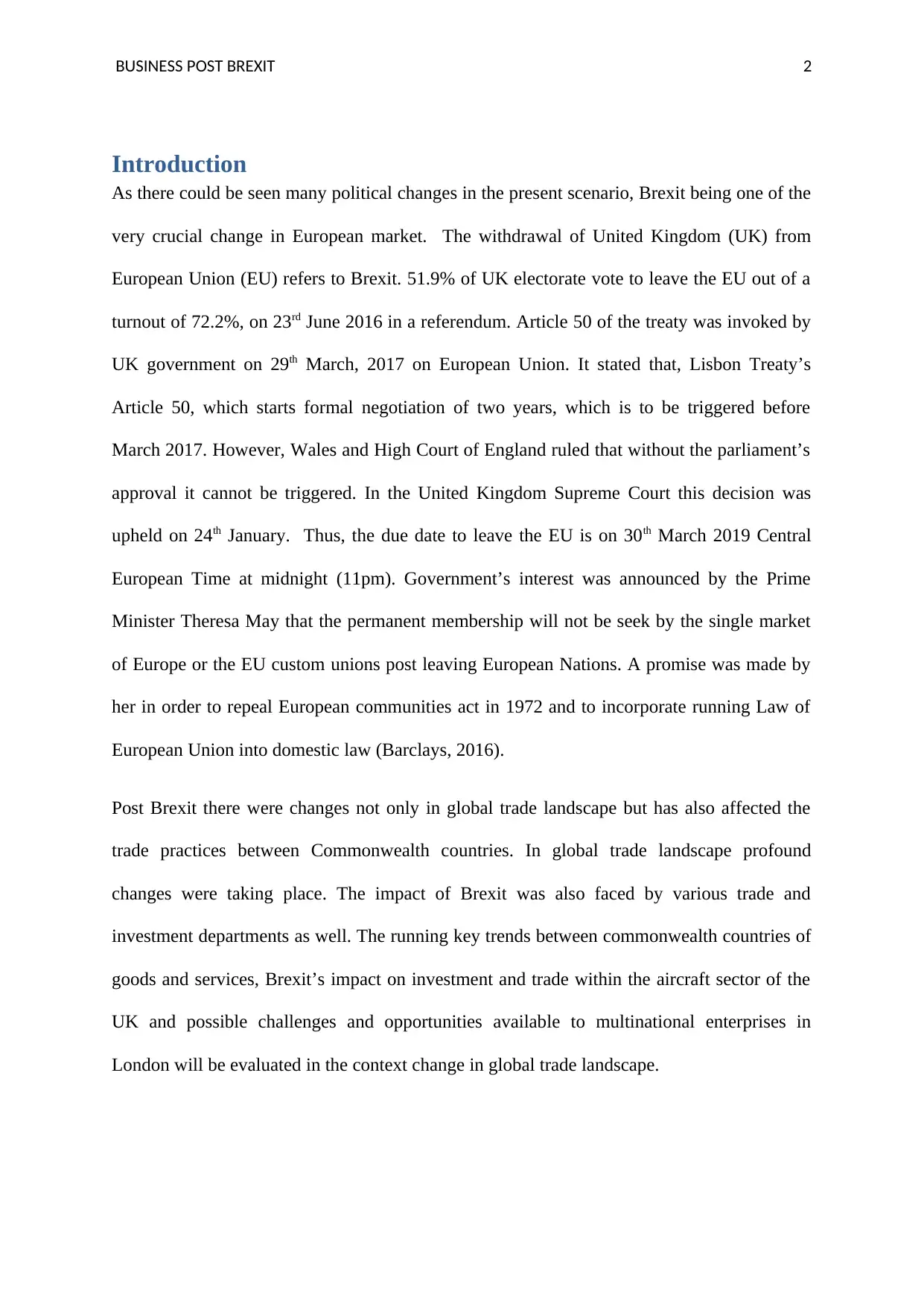
BUSINESS POST BREXIT 2
Introduction
As there could be seen many political changes in the present scenario, Brexit being one of the
very crucial change in European market. The withdrawal of United Kingdom (UK) from
European Union (EU) refers to Brexit. 51.9% of UK electorate vote to leave the EU out of a
turnout of 72.2%, on 23rd June 2016 in a referendum. Article 50 of the treaty was invoked by
UK government on 29th March, 2017 on European Union. It stated that, Lisbon Treaty’s
Article 50, which starts formal negotiation of two years, which is to be triggered before
March 2017. However, Wales and High Court of England ruled that without the parliament’s
approval it cannot be triggered. In the United Kingdom Supreme Court this decision was
upheld on 24th January. Thus, the due date to leave the EU is on 30th March 2019 Central
European Time at midnight (11pm). Government’s interest was announced by the Prime
Minister Theresa May that the permanent membership will not be seek by the single market
of Europe or the EU custom unions post leaving European Nations. A promise was made by
her in order to repeal European communities act in 1972 and to incorporate running Law of
European Union into domestic law (Barclays, 2016).
Post Brexit there were changes not only in global trade landscape but has also affected the
trade practices between Commonwealth countries. In global trade landscape profound
changes were taking place. The impact of Brexit was also faced by various trade and
investment departments as well. The running key trends between commonwealth countries of
goods and services, Brexit’s impact on investment and trade within the aircraft sector of the
UK and possible challenges and opportunities available to multinational enterprises in
London will be evaluated in the context change in global trade landscape.
Introduction
As there could be seen many political changes in the present scenario, Brexit being one of the
very crucial change in European market. The withdrawal of United Kingdom (UK) from
European Union (EU) refers to Brexit. 51.9% of UK electorate vote to leave the EU out of a
turnout of 72.2%, on 23rd June 2016 in a referendum. Article 50 of the treaty was invoked by
UK government on 29th March, 2017 on European Union. It stated that, Lisbon Treaty’s
Article 50, which starts formal negotiation of two years, which is to be triggered before
March 2017. However, Wales and High Court of England ruled that without the parliament’s
approval it cannot be triggered. In the United Kingdom Supreme Court this decision was
upheld on 24th January. Thus, the due date to leave the EU is on 30th March 2019 Central
European Time at midnight (11pm). Government’s interest was announced by the Prime
Minister Theresa May that the permanent membership will not be seek by the single market
of Europe or the EU custom unions post leaving European Nations. A promise was made by
her in order to repeal European communities act in 1972 and to incorporate running Law of
European Union into domestic law (Barclays, 2016).
Post Brexit there were changes not only in global trade landscape but has also affected the
trade practices between Commonwealth countries. In global trade landscape profound
changes were taking place. The impact of Brexit was also faced by various trade and
investment departments as well. The running key trends between commonwealth countries of
goods and services, Brexit’s impact on investment and trade within the aircraft sector of the
UK and possible challenges and opportunities available to multinational enterprises in
London will be evaluated in the context change in global trade landscape.
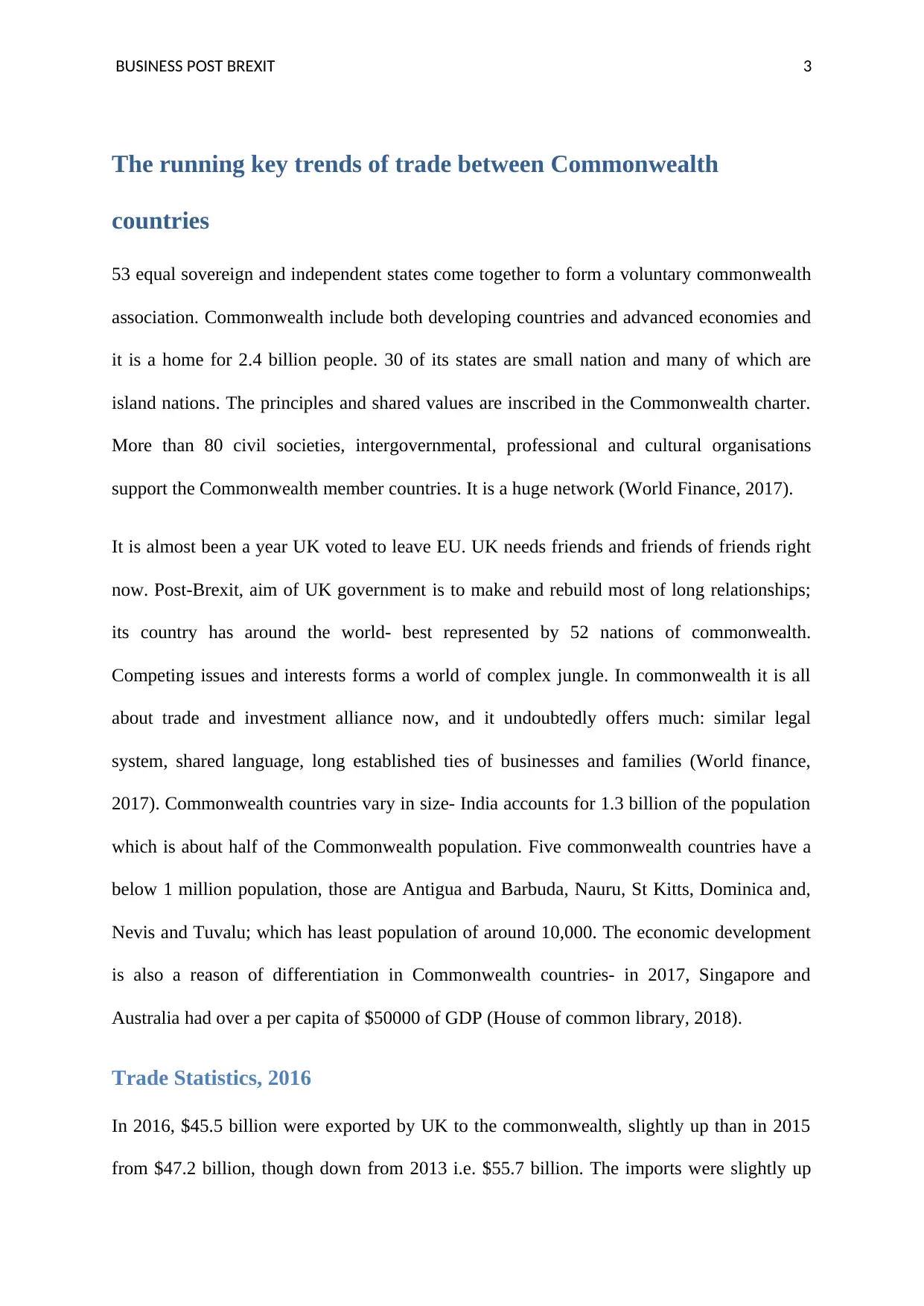
BUSINESS POST BREXIT 3
The running key trends of trade between Commonwealth
countries
53 equal sovereign and independent states come together to form a voluntary commonwealth
association. Commonwealth include both developing countries and advanced economies and
it is a home for 2.4 billion people. 30 of its states are small nation and many of which are
island nations. The principles and shared values are inscribed in the Commonwealth charter.
More than 80 civil societies, intergovernmental, professional and cultural organisations
support the Commonwealth member countries. It is a huge network (World Finance, 2017).
It is almost been a year UK voted to leave EU. UK needs friends and friends of friends right
now. Post-Brexit, aim of UK government is to make and rebuild most of long relationships;
its country has around the world- best represented by 52 nations of commonwealth.
Competing issues and interests forms a world of complex jungle. In commonwealth it is all
about trade and investment alliance now, and it undoubtedly offers much: similar legal
system, shared language, long established ties of businesses and families (World finance,
2017). Commonwealth countries vary in size- India accounts for 1.3 billion of the population
which is about half of the Commonwealth population. Five commonwealth countries have a
below 1 million population, those are Antigua and Barbuda, Nauru, St Kitts, Dominica and,
Nevis and Tuvalu; which has least population of around 10,000. The economic development
is also a reason of differentiation in Commonwealth countries- in 2017, Singapore and
Australia had over a per capita of $50000 of GDP (House of common library, 2018).
Trade Statistics, 2016
In 2016, $45.5 billion were exported by UK to the commonwealth, slightly up than in 2015
from $47.2 billion, though down from 2013 i.e. $55.7 billion. The imports were slightly up
The running key trends of trade between Commonwealth
countries
53 equal sovereign and independent states come together to form a voluntary commonwealth
association. Commonwealth include both developing countries and advanced economies and
it is a home for 2.4 billion people. 30 of its states are small nation and many of which are
island nations. The principles and shared values are inscribed in the Commonwealth charter.
More than 80 civil societies, intergovernmental, professional and cultural organisations
support the Commonwealth member countries. It is a huge network (World Finance, 2017).
It is almost been a year UK voted to leave EU. UK needs friends and friends of friends right
now. Post-Brexit, aim of UK government is to make and rebuild most of long relationships;
its country has around the world- best represented by 52 nations of commonwealth.
Competing issues and interests forms a world of complex jungle. In commonwealth it is all
about trade and investment alliance now, and it undoubtedly offers much: similar legal
system, shared language, long established ties of businesses and families (World finance,
2017). Commonwealth countries vary in size- India accounts for 1.3 billion of the population
which is about half of the Commonwealth population. Five commonwealth countries have a
below 1 million population, those are Antigua and Barbuda, Nauru, St Kitts, Dominica and,
Nevis and Tuvalu; which has least population of around 10,000. The economic development
is also a reason of differentiation in Commonwealth countries- in 2017, Singapore and
Australia had over a per capita of $50000 of GDP (House of common library, 2018).
Trade Statistics, 2016
In 2016, $45.5 billion were exported by UK to the commonwealth, slightly up than in 2015
from $47.2 billion, though down from 2013 i.e. $55.7 billion. The imports were slightly up
Secure Best Marks with AI Grader
Need help grading? Try our AI Grader for instant feedback on your assignments.
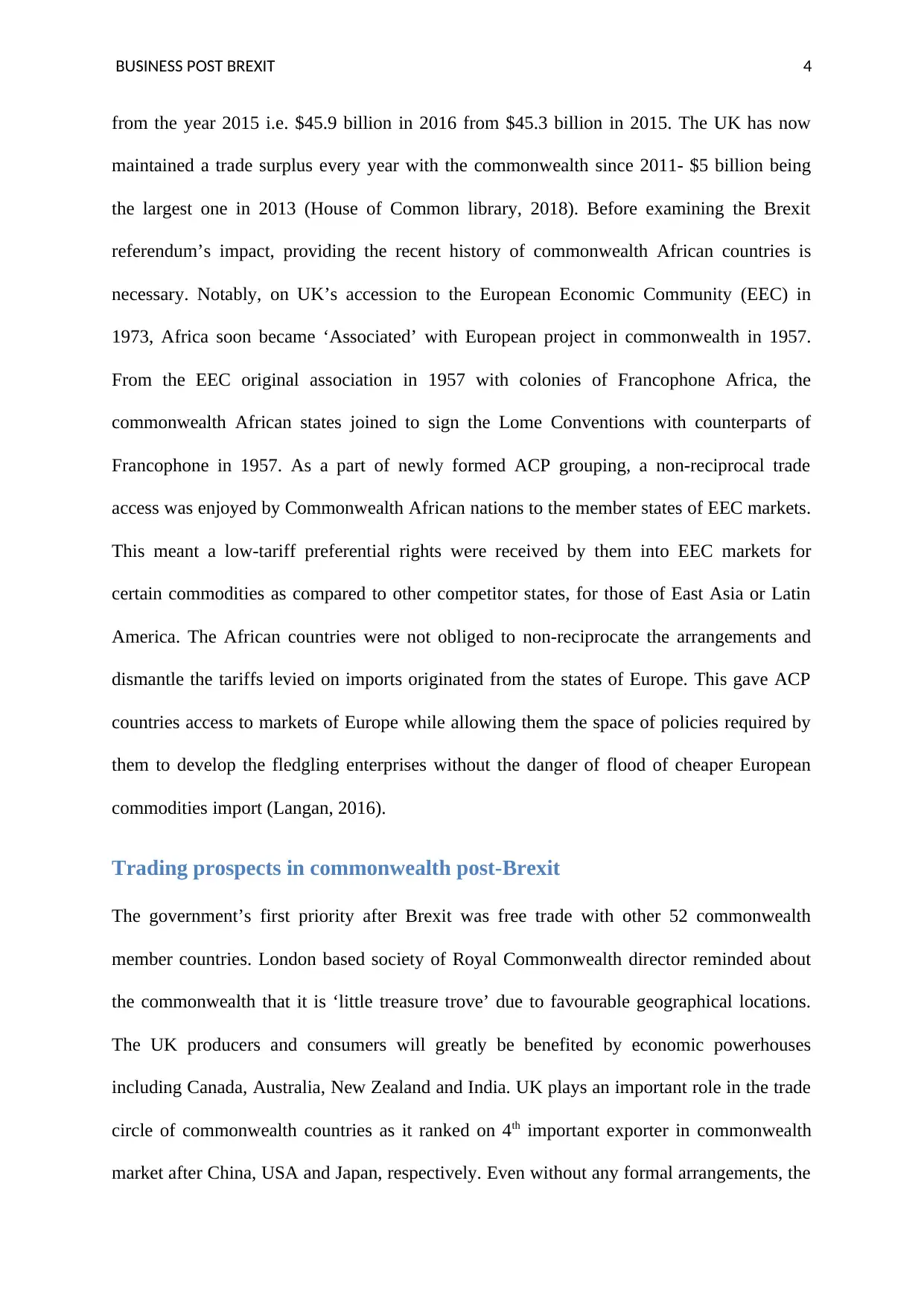
BUSINESS POST BREXIT 4
from the year 2015 i.e. $45.9 billion in 2016 from $45.3 billion in 2015. The UK has now
maintained a trade surplus every year with the commonwealth since 2011- $5 billion being
the largest one in 2013 (House of Common library, 2018). Before examining the Brexit
referendum’s impact, providing the recent history of commonwealth African countries is
necessary. Notably, on UK’s accession to the European Economic Community (EEC) in
1973, Africa soon became ‘Associated’ with European project in commonwealth in 1957.
From the EEC original association in 1957 with colonies of Francophone Africa, the
commonwealth African states joined to sign the Lome Conventions with counterparts of
Francophone in 1957. As a part of newly formed ACP grouping, a non-reciprocal trade
access was enjoyed by Commonwealth African nations to the member states of EEC markets.
This meant a low-tariff preferential rights were received by them into EEC markets for
certain commodities as compared to other competitor states, for those of East Asia or Latin
America. The African countries were not obliged to non-reciprocate the arrangements and
dismantle the tariffs levied on imports originated from the states of Europe. This gave ACP
countries access to markets of Europe while allowing them the space of policies required by
them to develop the fledgling enterprises without the danger of flood of cheaper European
commodities import (Langan, 2016).
Trading prospects in commonwealth post-Brexit
The government’s first priority after Brexit was free trade with other 52 commonwealth
member countries. London based society of Royal Commonwealth director reminded about
the commonwealth that it is ‘little treasure trove’ due to favourable geographical locations.
The UK producers and consumers will greatly be benefited by economic powerhouses
including Canada, Australia, New Zealand and India. UK plays an important role in the trade
circle of commonwealth countries as it ranked on 4th important exporter in commonwealth
market after China, USA and Japan, respectively. Even without any formal arrangements, the
from the year 2015 i.e. $45.9 billion in 2016 from $45.3 billion in 2015. The UK has now
maintained a trade surplus every year with the commonwealth since 2011- $5 billion being
the largest one in 2013 (House of Common library, 2018). Before examining the Brexit
referendum’s impact, providing the recent history of commonwealth African countries is
necessary. Notably, on UK’s accession to the European Economic Community (EEC) in
1973, Africa soon became ‘Associated’ with European project in commonwealth in 1957.
From the EEC original association in 1957 with colonies of Francophone Africa, the
commonwealth African states joined to sign the Lome Conventions with counterparts of
Francophone in 1957. As a part of newly formed ACP grouping, a non-reciprocal trade
access was enjoyed by Commonwealth African nations to the member states of EEC markets.
This meant a low-tariff preferential rights were received by them into EEC markets for
certain commodities as compared to other competitor states, for those of East Asia or Latin
America. The African countries were not obliged to non-reciprocate the arrangements and
dismantle the tariffs levied on imports originated from the states of Europe. This gave ACP
countries access to markets of Europe while allowing them the space of policies required by
them to develop the fledgling enterprises without the danger of flood of cheaper European
commodities import (Langan, 2016).
Trading prospects in commonwealth post-Brexit
The government’s first priority after Brexit was free trade with other 52 commonwealth
member countries. London based society of Royal Commonwealth director reminded about
the commonwealth that it is ‘little treasure trove’ due to favourable geographical locations.
The UK producers and consumers will greatly be benefited by economic powerhouses
including Canada, Australia, New Zealand and India. UK plays an important role in the trade
circle of commonwealth countries as it ranked on 4th important exporter in commonwealth
market after China, USA and Japan, respectively. Even without any formal arrangements, the
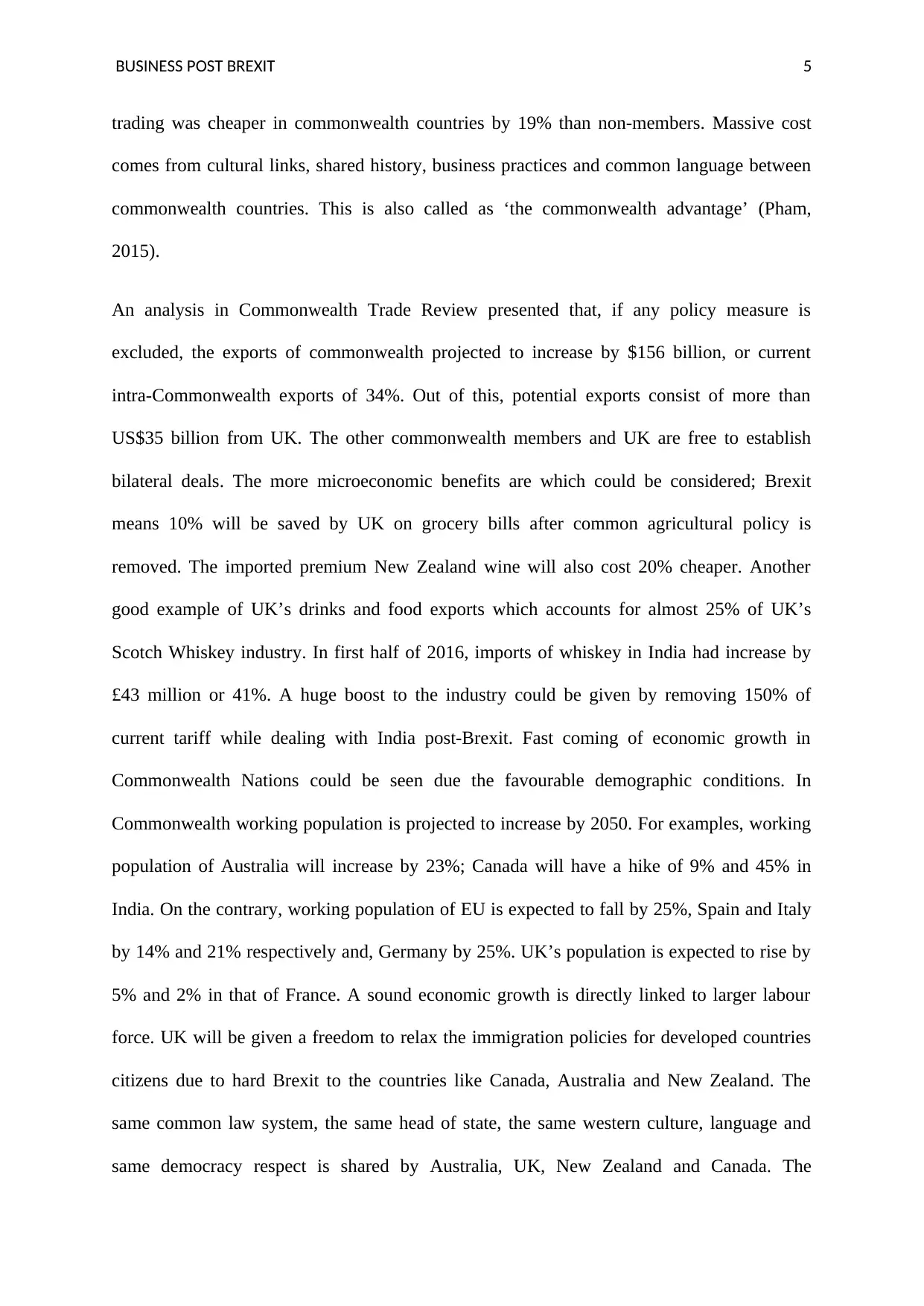
BUSINESS POST BREXIT 5
trading was cheaper in commonwealth countries by 19% than non-members. Massive cost
comes from cultural links, shared history, business practices and common language between
commonwealth countries. This is also called as ‘the commonwealth advantage’ (Pham,
2015).
An analysis in Commonwealth Trade Review presented that, if any policy measure is
excluded, the exports of commonwealth projected to increase by $156 billion, or current
intra-Commonwealth exports of 34%. Out of this, potential exports consist of more than
US$35 billion from UK. The other commonwealth members and UK are free to establish
bilateral deals. The more microeconomic benefits are which could be considered; Brexit
means 10% will be saved by UK on grocery bills after common agricultural policy is
removed. The imported premium New Zealand wine will also cost 20% cheaper. Another
good example of UK’s drinks and food exports which accounts for almost 25% of UK’s
Scotch Whiskey industry. In first half of 2016, imports of whiskey in India had increase by
£43 million or 41%. A huge boost to the industry could be given by removing 150% of
current tariff while dealing with India post-Brexit. Fast coming of economic growth in
Commonwealth Nations could be seen due the favourable demographic conditions. In
Commonwealth working population is projected to increase by 2050. For examples, working
population of Australia will increase by 23%; Canada will have a hike of 9% and 45% in
India. On the contrary, working population of EU is expected to fall by 25%, Spain and Italy
by 14% and 21% respectively and, Germany by 25%. UK’s population is expected to rise by
5% and 2% in that of France. A sound economic growth is directly linked to larger labour
force. UK will be given a freedom to relax the immigration policies for developed countries
citizens due to hard Brexit to the countries like Canada, Australia and New Zealand. The
same common law system, the same head of state, the same western culture, language and
same democracy respect is shared by Australia, UK, New Zealand and Canada. The
trading was cheaper in commonwealth countries by 19% than non-members. Massive cost
comes from cultural links, shared history, business practices and common language between
commonwealth countries. This is also called as ‘the commonwealth advantage’ (Pham,
2015).
An analysis in Commonwealth Trade Review presented that, if any policy measure is
excluded, the exports of commonwealth projected to increase by $156 billion, or current
intra-Commonwealth exports of 34%. Out of this, potential exports consist of more than
US$35 billion from UK. The other commonwealth members and UK are free to establish
bilateral deals. The more microeconomic benefits are which could be considered; Brexit
means 10% will be saved by UK on grocery bills after common agricultural policy is
removed. The imported premium New Zealand wine will also cost 20% cheaper. Another
good example of UK’s drinks and food exports which accounts for almost 25% of UK’s
Scotch Whiskey industry. In first half of 2016, imports of whiskey in India had increase by
£43 million or 41%. A huge boost to the industry could be given by removing 150% of
current tariff while dealing with India post-Brexit. Fast coming of economic growth in
Commonwealth Nations could be seen due the favourable demographic conditions. In
Commonwealth working population is projected to increase by 2050. For examples, working
population of Australia will increase by 23%; Canada will have a hike of 9% and 45% in
India. On the contrary, working population of EU is expected to fall by 25%, Spain and Italy
by 14% and 21% respectively and, Germany by 25%. UK’s population is expected to rise by
5% and 2% in that of France. A sound economic growth is directly linked to larger labour
force. UK will be given a freedom to relax the immigration policies for developed countries
citizens due to hard Brexit to the countries like Canada, Australia and New Zealand. The
same common law system, the same head of state, the same western culture, language and
same democracy respect is shared by Australia, UK, New Zealand and Canada. The
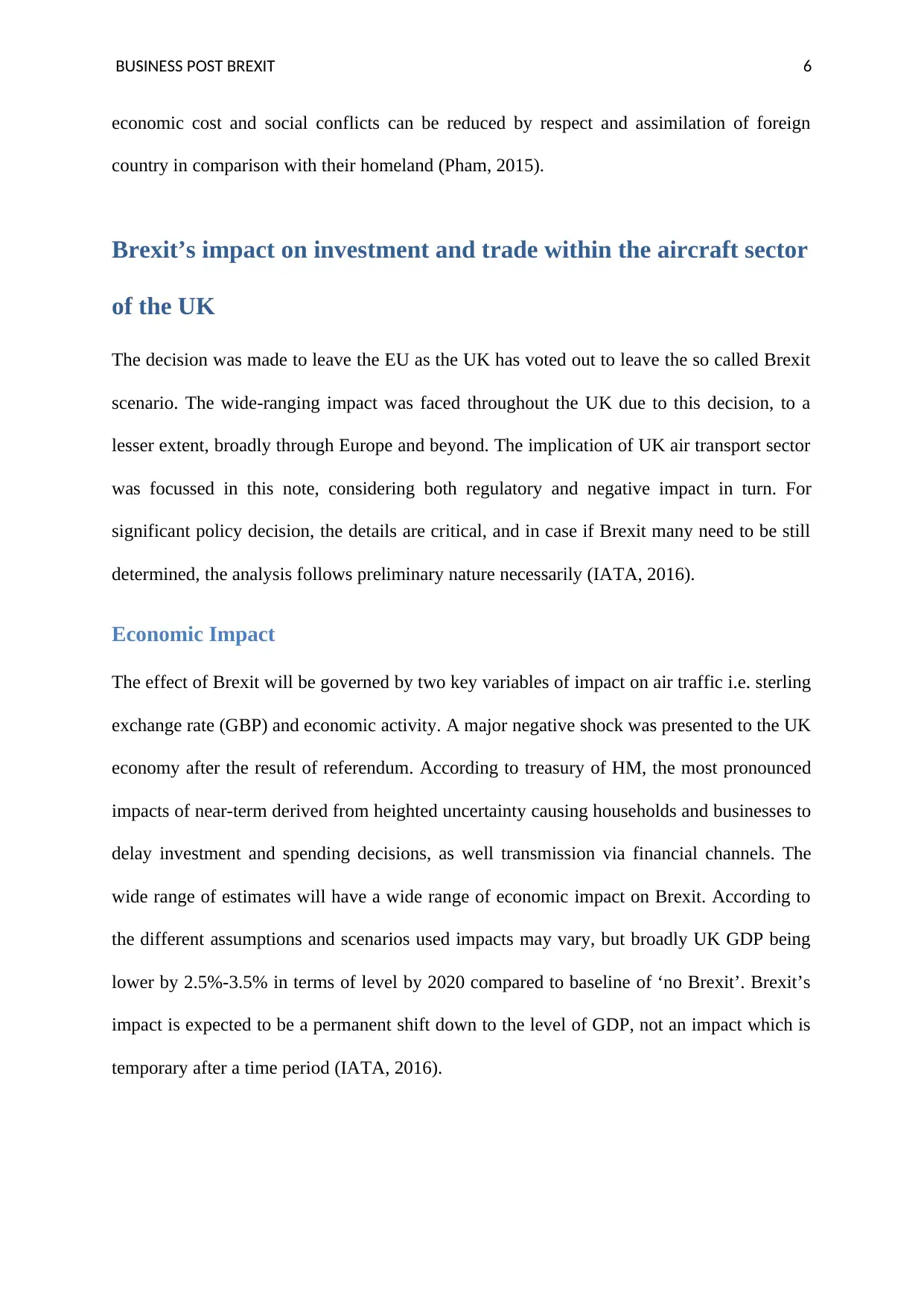
BUSINESS POST BREXIT 6
economic cost and social conflicts can be reduced by respect and assimilation of foreign
country in comparison with their homeland (Pham, 2015).
Brexit’s impact on investment and trade within the aircraft sector
of the UK
The decision was made to leave the EU as the UK has voted out to leave the so called Brexit
scenario. The wide-ranging impact was faced throughout the UK due to this decision, to a
lesser extent, broadly through Europe and beyond. The implication of UK air transport sector
was focussed in this note, considering both regulatory and negative impact in turn. For
significant policy decision, the details are critical, and in case if Brexit many need to be still
determined, the analysis follows preliminary nature necessarily (IATA, 2016).
Economic Impact
The effect of Brexit will be governed by two key variables of impact on air traffic i.e. sterling
exchange rate (GBP) and economic activity. A major negative shock was presented to the UK
economy after the result of referendum. According to treasury of HM, the most pronounced
impacts of near-term derived from heighted uncertainty causing households and businesses to
delay investment and spending decisions, as well transmission via financial channels. The
wide range of estimates will have a wide range of economic impact on Brexit. According to
the different assumptions and scenarios used impacts may vary, but broadly UK GDP being
lower by 2.5%-3.5% in terms of level by 2020 compared to baseline of ‘no Brexit’. Brexit’s
impact is expected to be a permanent shift down to the level of GDP, not an impact which is
temporary after a time period (IATA, 2016).
economic cost and social conflicts can be reduced by respect and assimilation of foreign
country in comparison with their homeland (Pham, 2015).
Brexit’s impact on investment and trade within the aircraft sector
of the UK
The decision was made to leave the EU as the UK has voted out to leave the so called Brexit
scenario. The wide-ranging impact was faced throughout the UK due to this decision, to a
lesser extent, broadly through Europe and beyond. The implication of UK air transport sector
was focussed in this note, considering both regulatory and negative impact in turn. For
significant policy decision, the details are critical, and in case if Brexit many need to be still
determined, the analysis follows preliminary nature necessarily (IATA, 2016).
Economic Impact
The effect of Brexit will be governed by two key variables of impact on air traffic i.e. sterling
exchange rate (GBP) and economic activity. A major negative shock was presented to the UK
economy after the result of referendum. According to treasury of HM, the most pronounced
impacts of near-term derived from heighted uncertainty causing households and businesses to
delay investment and spending decisions, as well transmission via financial channels. The
wide range of estimates will have a wide range of economic impact on Brexit. According to
the different assumptions and scenarios used impacts may vary, but broadly UK GDP being
lower by 2.5%-3.5% in terms of level by 2020 compared to baseline of ‘no Brexit’. Brexit’s
impact is expected to be a permanent shift down to the level of GDP, not an impact which is
temporary after a time period (IATA, 2016).
Paraphrase This Document
Need a fresh take? Get an instant paraphrase of this document with our AI Paraphraser
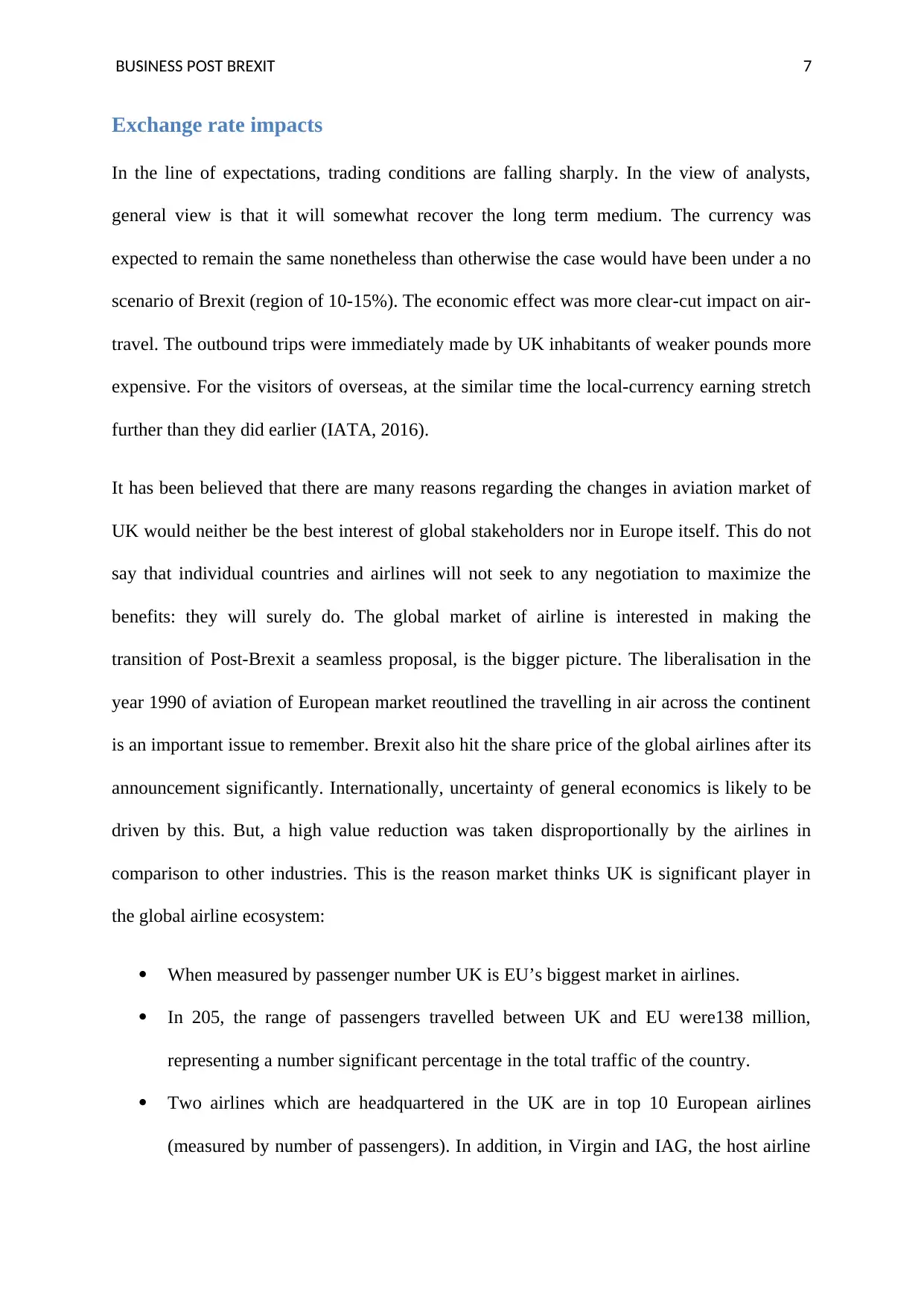
BUSINESS POST BREXIT 7
Exchange rate impacts
In the line of expectations, trading conditions are falling sharply. In the view of analysts,
general view is that it will somewhat recover the long term medium. The currency was
expected to remain the same nonetheless than otherwise the case would have been under a no
scenario of Brexit (region of 10-15%). The economic effect was more clear-cut impact on air-
travel. The outbound trips were immediately made by UK inhabitants of weaker pounds more
expensive. For the visitors of overseas, at the similar time the local-currency earning stretch
further than they did earlier (IATA, 2016).
It has been believed that there are many reasons regarding the changes in aviation market of
UK would neither be the best interest of global stakeholders nor in Europe itself. This do not
say that individual countries and airlines will not seek to any negotiation to maximize the
benefits: they will surely do. The global market of airline is interested in making the
transition of Post-Brexit a seamless proposal, is the bigger picture. The liberalisation in the
year 1990 of aviation of European market reoutlined the travelling in air across the continent
is an important issue to remember. Brexit also hit the share price of the global airlines after its
announcement significantly. Internationally, uncertainty of general economics is likely to be
driven by this. But, a high value reduction was taken disproportionally by the airlines in
comparison to other industries. This is the reason market thinks UK is significant player in
the global airline ecosystem:
When measured by passenger number UK is EU’s biggest market in airlines.
In 205, the range of passengers travelled between UK and EU were138 million,
representing a number significant percentage in the total traffic of the country.
Two airlines which are headquartered in the UK are in top 10 European airlines
(measured by number of passengers). In addition, in Virgin and IAG, the host airline
Exchange rate impacts
In the line of expectations, trading conditions are falling sharply. In the view of analysts,
general view is that it will somewhat recover the long term medium. The currency was
expected to remain the same nonetheless than otherwise the case would have been under a no
scenario of Brexit (region of 10-15%). The economic effect was more clear-cut impact on air-
travel. The outbound trips were immediately made by UK inhabitants of weaker pounds more
expensive. For the visitors of overseas, at the similar time the local-currency earning stretch
further than they did earlier (IATA, 2016).
It has been believed that there are many reasons regarding the changes in aviation market of
UK would neither be the best interest of global stakeholders nor in Europe itself. This do not
say that individual countries and airlines will not seek to any negotiation to maximize the
benefits: they will surely do. The global market of airline is interested in making the
transition of Post-Brexit a seamless proposal, is the bigger picture. The liberalisation in the
year 1990 of aviation of European market reoutlined the travelling in air across the continent
is an important issue to remember. Brexit also hit the share price of the global airlines after its
announcement significantly. Internationally, uncertainty of general economics is likely to be
driven by this. But, a high value reduction was taken disproportionally by the airlines in
comparison to other industries. This is the reason market thinks UK is significant player in
the global airline ecosystem:
When measured by passenger number UK is EU’s biggest market in airlines.
In 205, the range of passengers travelled between UK and EU were138 million,
representing a number significant percentage in the total traffic of the country.
Two airlines which are headquartered in the UK are in top 10 European airlines
(measured by number of passengers). In addition, in Virgin and IAG, the host airline
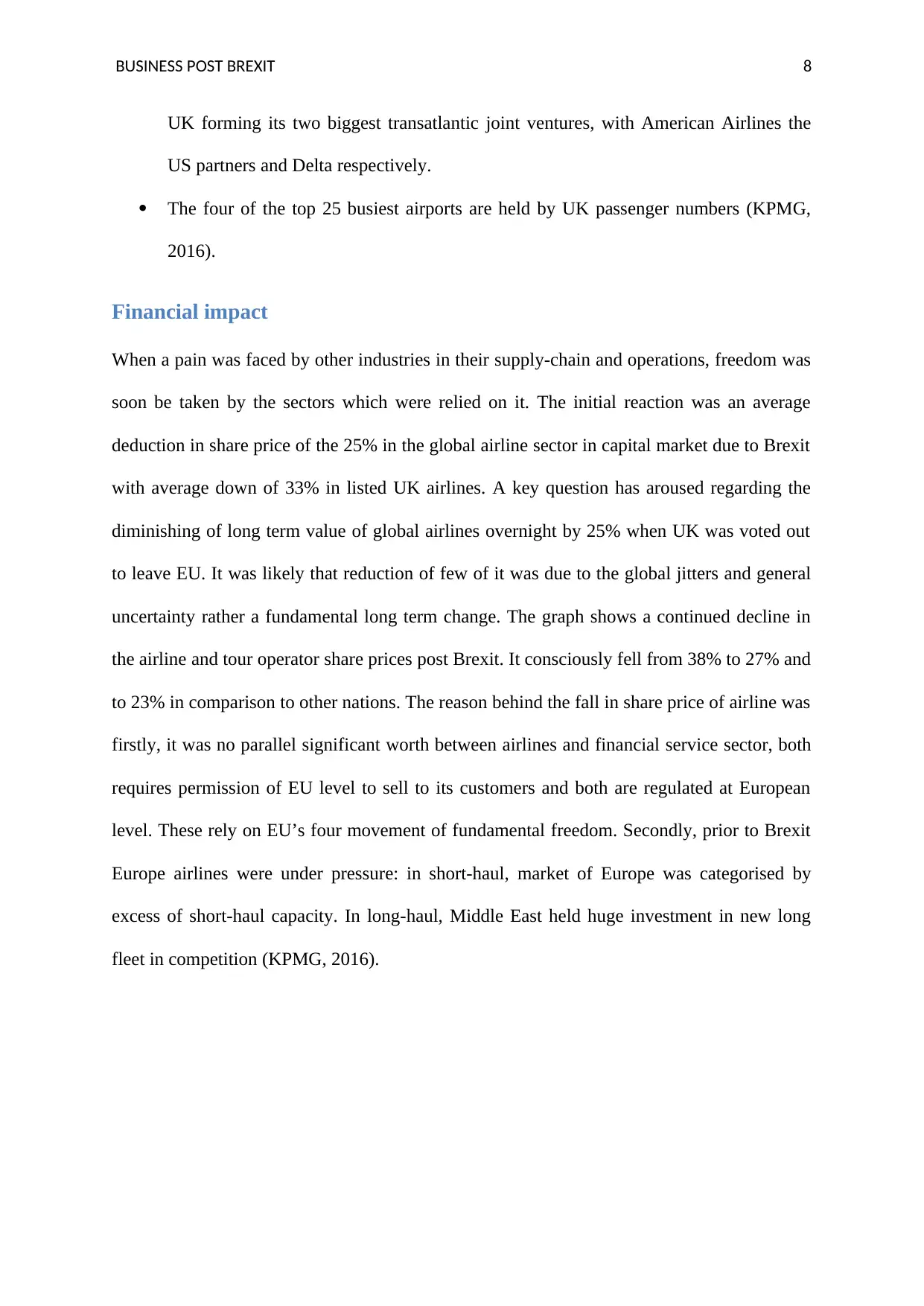
BUSINESS POST BREXIT 8
UK forming its two biggest transatlantic joint ventures, with American Airlines the
US partners and Delta respectively.
The four of the top 25 busiest airports are held by UK passenger numbers (KPMG,
2016).
Financial impact
When a pain was faced by other industries in their supply-chain and operations, freedom was
soon be taken by the sectors which were relied on it. The initial reaction was an average
deduction in share price of the 25% in the global airline sector in capital market due to Brexit
with average down of 33% in listed UK airlines. A key question has aroused regarding the
diminishing of long term value of global airlines overnight by 25% when UK was voted out
to leave EU. It was likely that reduction of few of it was due to the global jitters and general
uncertainty rather a fundamental long term change. The graph shows a continued decline in
the airline and tour operator share prices post Brexit. It consciously fell from 38% to 27% and
to 23% in comparison to other nations. The reason behind the fall in share price of airline was
firstly, it was no parallel significant worth between airlines and financial service sector, both
requires permission of EU level to sell to its customers and both are regulated at European
level. These rely on EU’s four movement of fundamental freedom. Secondly, prior to Brexit
Europe airlines were under pressure: in short-haul, market of Europe was categorised by
excess of short-haul capacity. In long-haul, Middle East held huge investment in new long
fleet in competition (KPMG, 2016).
UK forming its two biggest transatlantic joint ventures, with American Airlines the
US partners and Delta respectively.
The four of the top 25 busiest airports are held by UK passenger numbers (KPMG,
2016).
Financial impact
When a pain was faced by other industries in their supply-chain and operations, freedom was
soon be taken by the sectors which were relied on it. The initial reaction was an average
deduction in share price of the 25% in the global airline sector in capital market due to Brexit
with average down of 33% in listed UK airlines. A key question has aroused regarding the
diminishing of long term value of global airlines overnight by 25% when UK was voted out
to leave EU. It was likely that reduction of few of it was due to the global jitters and general
uncertainty rather a fundamental long term change. The graph shows a continued decline in
the airline and tour operator share prices post Brexit. It consciously fell from 38% to 27% and
to 23% in comparison to other nations. The reason behind the fall in share price of airline was
firstly, it was no parallel significant worth between airlines and financial service sector, both
requires permission of EU level to sell to its customers and both are regulated at European
level. These rely on EU’s four movement of fundamental freedom. Secondly, prior to Brexit
Europe airlines were under pressure: in short-haul, market of Europe was categorised by
excess of short-haul capacity. In long-haul, Middle East held huge investment in new long
fleet in competition (KPMG, 2016).
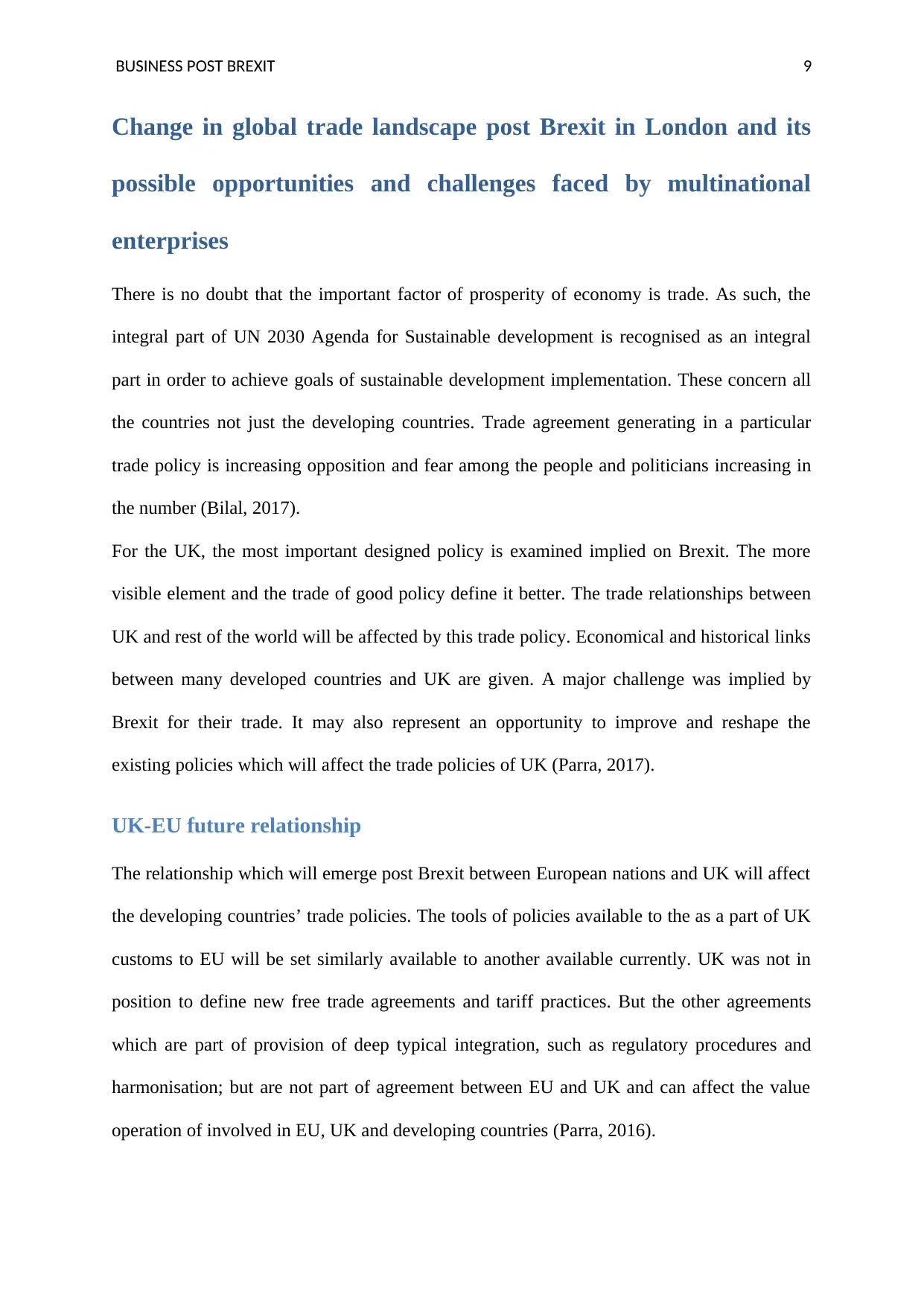
BUSINESS POST BREXIT 9
Change in global trade landscape post Brexit in London and its
possible opportunities and challenges faced by multinational
enterprises
There is no doubt that the important factor of prosperity of economy is trade. As such, the
integral part of UN 2030 Agenda for Sustainable development is recognised as an integral
part in order to achieve goals of sustainable development implementation. These concern all
the countries not just the developing countries. Trade agreement generating in a particular
trade policy is increasing opposition and fear among the people and politicians increasing in
the number (Bilal, 2017).
For the UK, the most important designed policy is examined implied on Brexit. The more
visible element and the trade of good policy define it better. The trade relationships between
UK and rest of the world will be affected by this trade policy. Economical and historical links
between many developed countries and UK are given. A major challenge was implied by
Brexit for their trade. It may also represent an opportunity to improve and reshape the
existing policies which will affect the trade policies of UK (Parra, 2017).
UK-EU future relationship
The relationship which will emerge post Brexit between European nations and UK will affect
the developing countries’ trade policies. The tools of policies available to the as a part of UK
customs to EU will be set similarly available to another available currently. UK was not in
position to define new free trade agreements and tariff practices. But the other agreements
which are part of provision of deep typical integration, such as regulatory procedures and
harmonisation; but are not part of agreement between EU and UK and can affect the value
operation of involved in EU, UK and developing countries (Parra, 2016).
Change in global trade landscape post Brexit in London and its
possible opportunities and challenges faced by multinational
enterprises
There is no doubt that the important factor of prosperity of economy is trade. As such, the
integral part of UN 2030 Agenda for Sustainable development is recognised as an integral
part in order to achieve goals of sustainable development implementation. These concern all
the countries not just the developing countries. Trade agreement generating in a particular
trade policy is increasing opposition and fear among the people and politicians increasing in
the number (Bilal, 2017).
For the UK, the most important designed policy is examined implied on Brexit. The more
visible element and the trade of good policy define it better. The trade relationships between
UK and rest of the world will be affected by this trade policy. Economical and historical links
between many developed countries and UK are given. A major challenge was implied by
Brexit for their trade. It may also represent an opportunity to improve and reshape the
existing policies which will affect the trade policies of UK (Parra, 2017).
UK-EU future relationship
The relationship which will emerge post Brexit between European nations and UK will affect
the developing countries’ trade policies. The tools of policies available to the as a part of UK
customs to EU will be set similarly available to another available currently. UK was not in
position to define new free trade agreements and tariff practices. But the other agreements
which are part of provision of deep typical integration, such as regulatory procedures and
harmonisation; but are not part of agreement between EU and UK and can affect the value
operation of involved in EU, UK and developing countries (Parra, 2016).
Secure Best Marks with AI Grader
Need help grading? Try our AI Grader for instant feedback on your assignments.
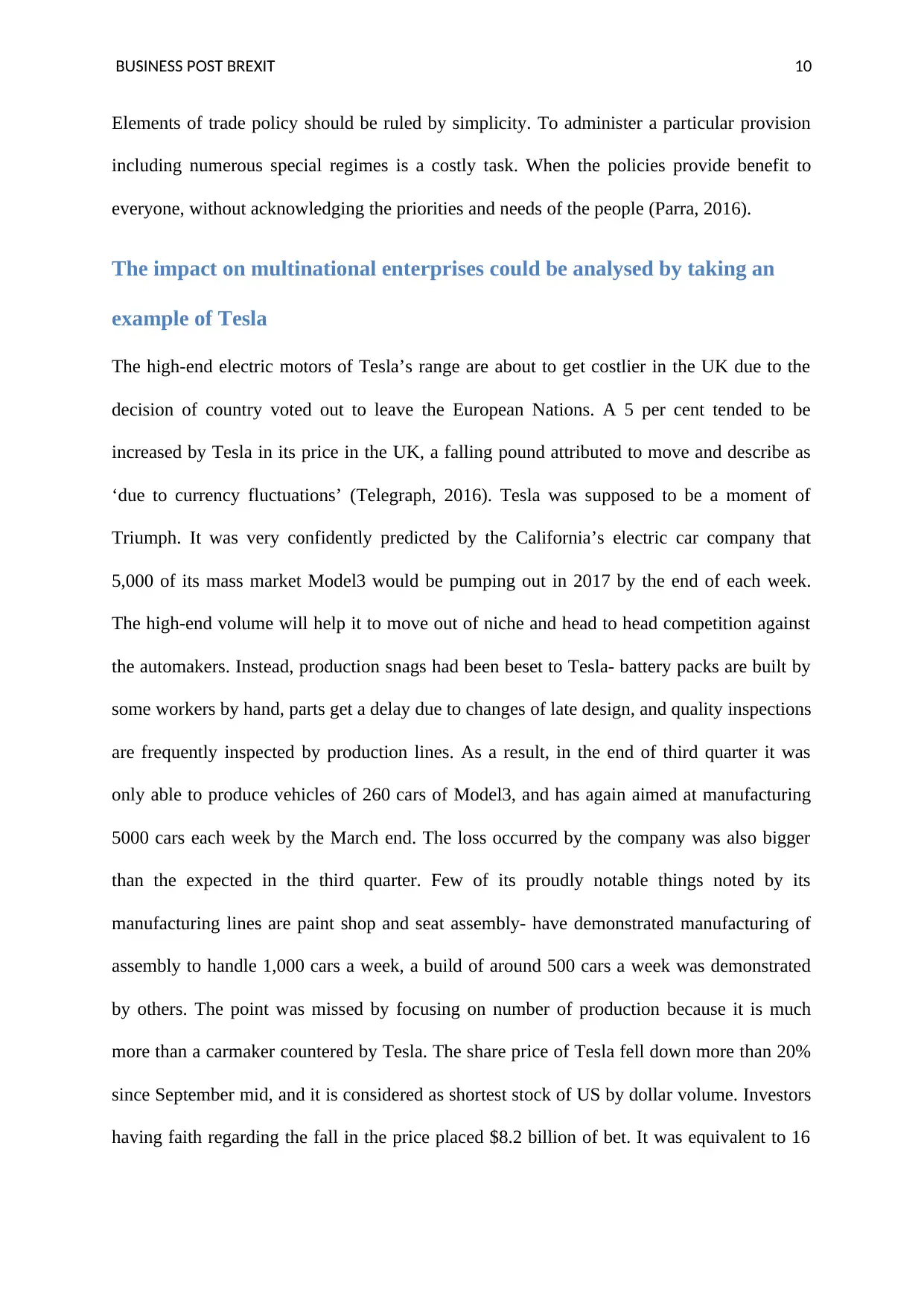
BUSINESS POST BREXIT 10
Elements of trade policy should be ruled by simplicity. To administer a particular provision
including numerous special regimes is a costly task. When the policies provide benefit to
everyone, without acknowledging the priorities and needs of the people (Parra, 2016).
The impact on multinational enterprises could be analysed by taking an
example of Tesla
The high-end electric motors of Tesla’s range are about to get costlier in the UK due to the
decision of country voted out to leave the European Nations. A 5 per cent tended to be
increased by Tesla in its price in the UK, a falling pound attributed to move and describe as
‘due to currency fluctuations’ (Telegraph, 2016). Tesla was supposed to be a moment of
Triumph. It was very confidently predicted by the California’s electric car company that
5,000 of its mass market Model3 would be pumping out in 2017 by the end of each week.
The high-end volume will help it to move out of niche and head to head competition against
the automakers. Instead, production snags had been beset to Tesla- battery packs are built by
some workers by hand, parts get a delay due to changes of late design, and quality inspections
are frequently inspected by production lines. As a result, in the end of third quarter it was
only able to produce vehicles of 260 cars of Model3, and has again aimed at manufacturing
5000 cars each week by the March end. The loss occurred by the company was also bigger
than the expected in the third quarter. Few of its proudly notable things noted by its
manufacturing lines are paint shop and seat assembly- have demonstrated manufacturing of
assembly to handle 1,000 cars a week, a build of around 500 cars a week was demonstrated
by others. The point was missed by focusing on number of production because it is much
more than a carmaker countered by Tesla. The share price of Tesla fell down more than 20%
since September mid, and it is considered as shortest stock of US by dollar volume. Investors
having faith regarding the fall in the price placed $8.2 billion of bet. It was equivalent to 16
Elements of trade policy should be ruled by simplicity. To administer a particular provision
including numerous special regimes is a costly task. When the policies provide benefit to
everyone, without acknowledging the priorities and needs of the people (Parra, 2016).
The impact on multinational enterprises could be analysed by taking an
example of Tesla
The high-end electric motors of Tesla’s range are about to get costlier in the UK due to the
decision of country voted out to leave the European Nations. A 5 per cent tended to be
increased by Tesla in its price in the UK, a falling pound attributed to move and describe as
‘due to currency fluctuations’ (Telegraph, 2016). Tesla was supposed to be a moment of
Triumph. It was very confidently predicted by the California’s electric car company that
5,000 of its mass market Model3 would be pumping out in 2017 by the end of each week.
The high-end volume will help it to move out of niche and head to head competition against
the automakers. Instead, production snags had been beset to Tesla- battery packs are built by
some workers by hand, parts get a delay due to changes of late design, and quality inspections
are frequently inspected by production lines. As a result, in the end of third quarter it was
only able to produce vehicles of 260 cars of Model3, and has again aimed at manufacturing
5000 cars each week by the March end. The loss occurred by the company was also bigger
than the expected in the third quarter. Few of its proudly notable things noted by its
manufacturing lines are paint shop and seat assembly- have demonstrated manufacturing of
assembly to handle 1,000 cars a week, a build of around 500 cars a week was demonstrated
by others. The point was missed by focusing on number of production because it is much
more than a carmaker countered by Tesla. The share price of Tesla fell down more than 20%
since September mid, and it is considered as shortest stock of US by dollar volume. Investors
having faith regarding the fall in the price placed $8.2 billion of bet. It was equivalent to 16
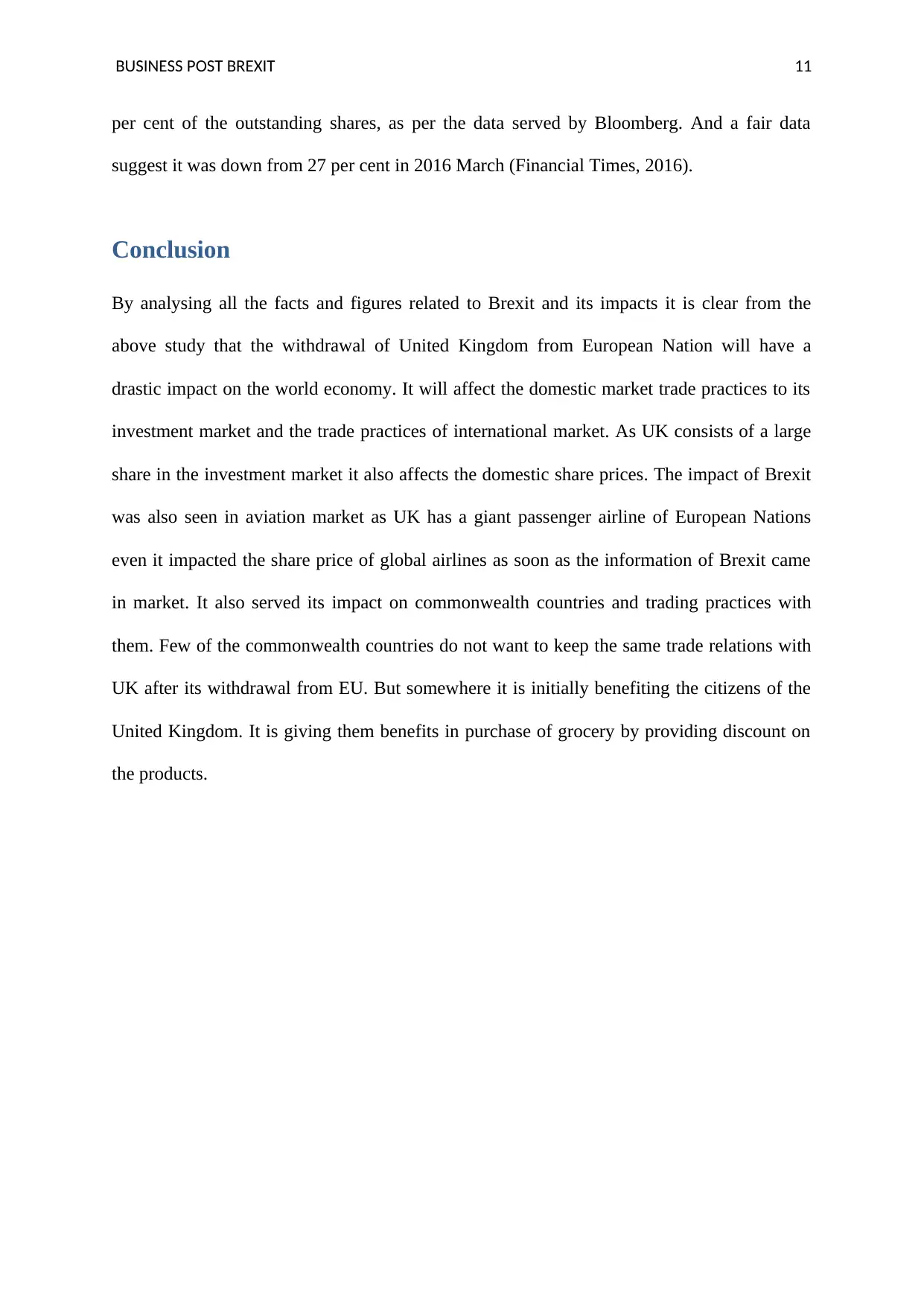
BUSINESS POST BREXIT 11
per cent of the outstanding shares, as per the data served by Bloomberg. And a fair data
suggest it was down from 27 per cent in 2016 March (Financial Times, 2016).
Conclusion
By analysing all the facts and figures related to Brexit and its impacts it is clear from the
above study that the withdrawal of United Kingdom from European Nation will have a
drastic impact on the world economy. It will affect the domestic market trade practices to its
investment market and the trade practices of international market. As UK consists of a large
share in the investment market it also affects the domestic share prices. The impact of Brexit
was also seen in aviation market as UK has a giant passenger airline of European Nations
even it impacted the share price of global airlines as soon as the information of Brexit came
in market. It also served its impact on commonwealth countries and trading practices with
them. Few of the commonwealth countries do not want to keep the same trade relations with
UK after its withdrawal from EU. But somewhere it is initially benefiting the citizens of the
United Kingdom. It is giving them benefits in purchase of grocery by providing discount on
the products.
per cent of the outstanding shares, as per the data served by Bloomberg. And a fair data
suggest it was down from 27 per cent in 2016 March (Financial Times, 2016).
Conclusion
By analysing all the facts and figures related to Brexit and its impacts it is clear from the
above study that the withdrawal of United Kingdom from European Nation will have a
drastic impact on the world economy. It will affect the domestic market trade practices to its
investment market and the trade practices of international market. As UK consists of a large
share in the investment market it also affects the domestic share prices. The impact of Brexit
was also seen in aviation market as UK has a giant passenger airline of European Nations
even it impacted the share price of global airlines as soon as the information of Brexit came
in market. It also served its impact on commonwealth countries and trading practices with
them. Few of the commonwealth countries do not want to keep the same trade relations with
UK after its withdrawal from EU. But somewhere it is initially benefiting the citizens of the
United Kingdom. It is giving them benefits in purchase of grocery by providing discount on
the products.
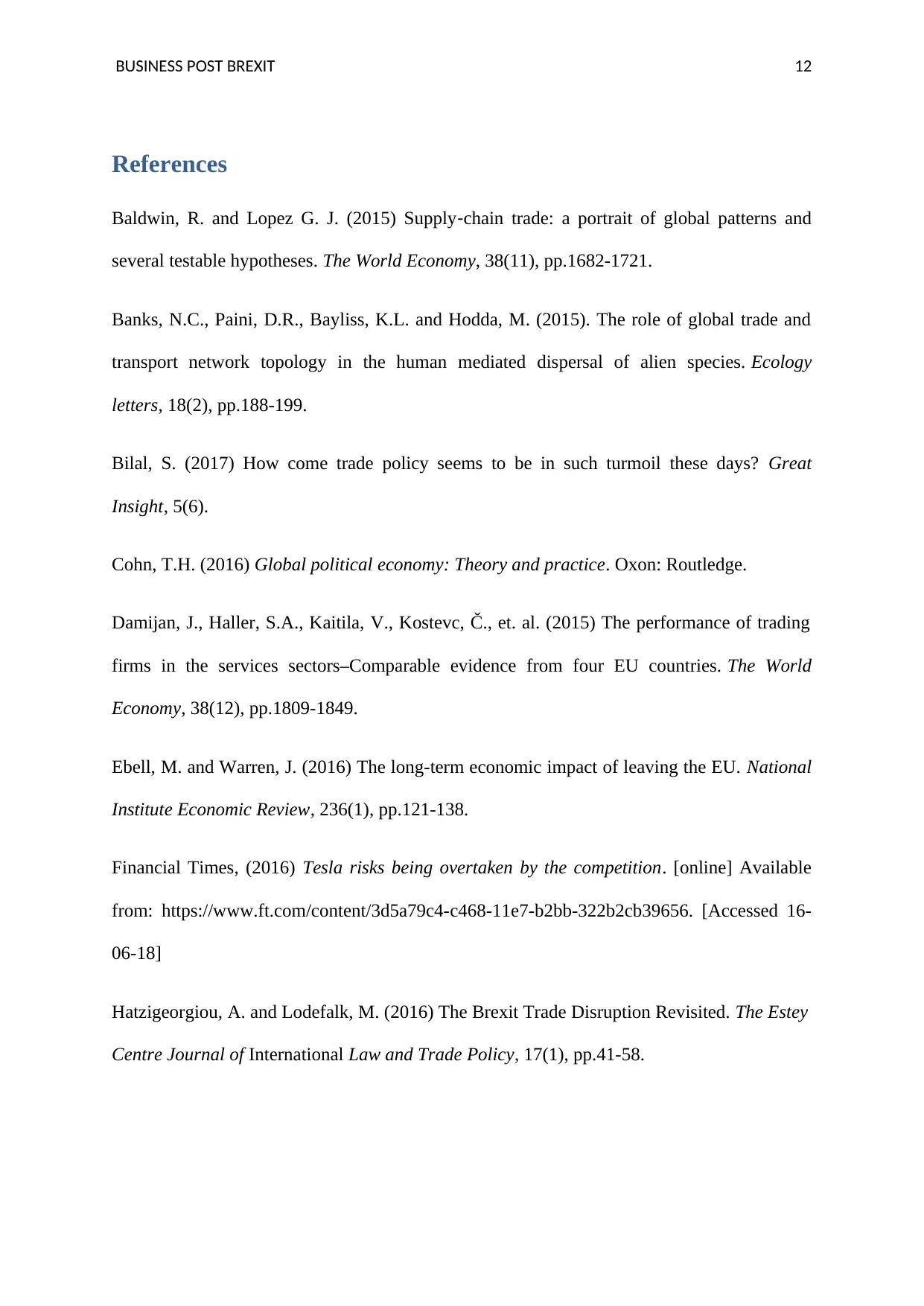
BUSINESS POST BREXIT 12
References
Baldwin, R. and Lopez G. J. (2015) Supply‐chain trade: a portrait of global patterns and
several testable hypotheses. The World Economy, 38(11), pp.1682-1721.
Banks, N.C., Paini, D.R., Bayliss, K.L. and Hodda, M. (2015). The role of global trade and
transport network topology in the human mediated dispersal of alien species. Ecology
letters, 18(2), pp.188-199.
Bilal, S. (2017) How come trade policy seems to be in such turmoil these days? Great
Insight, 5(6).
Cohn, T.H. (2016) Global political economy: Theory and practice. Oxon: Routledge.
Damijan, J., Haller, S.A., Kaitila, V., Kostevc, Č., et. al. (2015) The performance of trading
firms in the services sectors–Comparable evidence from four EU countries. The World
Economy, 38(12), pp.1809-1849.
Ebell, M. and Warren, J. (2016) The long-term economic impact of leaving the EU. National
Institute Economic Review, 236(1), pp.121-138.
Financial Times, (2016) Tesla risks being overtaken by the competition. [online] Available
from: https://www.ft.com/content/3d5a79c4-c468-11e7-b2bb-322b2cb39656. [Accessed 16-
06-18]
Hatzigeorgiou, A. and Lodefalk, M. (2016) The Brexit Trade Disruption Revisited. The Estey
Centre Journal of International Law and Trade Policy, 17(1), pp.41-58.
References
Baldwin, R. and Lopez G. J. (2015) Supply‐chain trade: a portrait of global patterns and
several testable hypotheses. The World Economy, 38(11), pp.1682-1721.
Banks, N.C., Paini, D.R., Bayliss, K.L. and Hodda, M. (2015). The role of global trade and
transport network topology in the human mediated dispersal of alien species. Ecology
letters, 18(2), pp.188-199.
Bilal, S. (2017) How come trade policy seems to be in such turmoil these days? Great
Insight, 5(6).
Cohn, T.H. (2016) Global political economy: Theory and practice. Oxon: Routledge.
Damijan, J., Haller, S.A., Kaitila, V., Kostevc, Č., et. al. (2015) The performance of trading
firms in the services sectors–Comparable evidence from four EU countries. The World
Economy, 38(12), pp.1809-1849.
Ebell, M. and Warren, J. (2016) The long-term economic impact of leaving the EU. National
Institute Economic Review, 236(1), pp.121-138.
Financial Times, (2016) Tesla risks being overtaken by the competition. [online] Available
from: https://www.ft.com/content/3d5a79c4-c468-11e7-b2bb-322b2cb39656. [Accessed 16-
06-18]
Hatzigeorgiou, A. and Lodefalk, M. (2016) The Brexit Trade Disruption Revisited. The Estey
Centre Journal of International Law and Trade Policy, 17(1), pp.41-58.
Paraphrase This Document
Need a fresh take? Get an instant paraphrase of this document with our AI Paraphraser
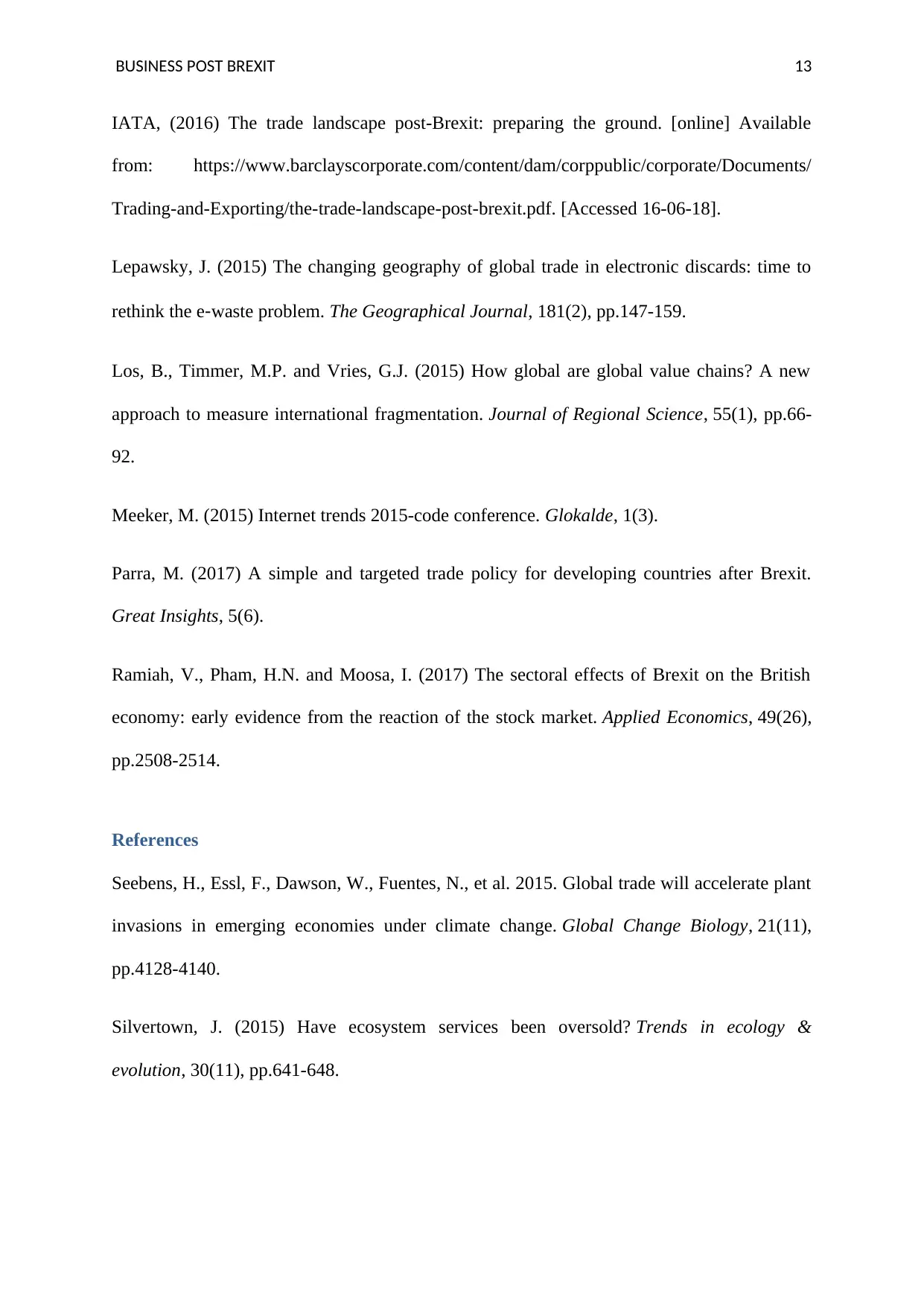
BUSINESS POST BREXIT 13
IATA, (2016) The trade landscape post-Brexit: preparing the ground. [online] Available
from: https://www.barclayscorporate.com/content/dam/corppublic/corporate/Documents/
Trading-and-Exporting/the-trade-landscape-post-brexit.pdf. [Accessed 16-06-18].
Lepawsky, J. (2015) The changing geography of global trade in electronic discards: time to
rethink the e‐waste problem. The Geographical Journal, 181(2), pp.147-159.
Los, B., Timmer, M.P. and Vries, G.J. (2015) How global are global value chains? A new
approach to measure international fragmentation. Journal of Regional Science, 55(1), pp.66-
92.
Meeker, M. (2015) Internet trends 2015-code conference. Glokalde, 1(3).
Parra, M. (2017) A simple and targeted trade policy for developing countries after Brexit.
Great Insights, 5(6).
Ramiah, V., Pham, H.N. and Moosa, I. (2017) The sectoral effects of Brexit on the British
economy: early evidence from the reaction of the stock market. Applied Economics, 49(26),
pp.2508-2514.
References
Seebens, H., Essl, F., Dawson, W., Fuentes, N., et al. 2015. Global trade will accelerate plant
invasions in emerging economies under climate change. Global Change Biology, 21(11),
pp.4128-4140.
Silvertown, J. (2015) Have ecosystem services been oversold? Trends in ecology &
evolution, 30(11), pp.641-648.
IATA, (2016) The trade landscape post-Brexit: preparing the ground. [online] Available
from: https://www.barclayscorporate.com/content/dam/corppublic/corporate/Documents/
Trading-and-Exporting/the-trade-landscape-post-brexit.pdf. [Accessed 16-06-18].
Lepawsky, J. (2015) The changing geography of global trade in electronic discards: time to
rethink the e‐waste problem. The Geographical Journal, 181(2), pp.147-159.
Los, B., Timmer, M.P. and Vries, G.J. (2015) How global are global value chains? A new
approach to measure international fragmentation. Journal of Regional Science, 55(1), pp.66-
92.
Meeker, M. (2015) Internet trends 2015-code conference. Glokalde, 1(3).
Parra, M. (2017) A simple and targeted trade policy for developing countries after Brexit.
Great Insights, 5(6).
Ramiah, V., Pham, H.N. and Moosa, I. (2017) The sectoral effects of Brexit on the British
economy: early evidence from the reaction of the stock market. Applied Economics, 49(26),
pp.2508-2514.
References
Seebens, H., Essl, F., Dawson, W., Fuentes, N., et al. 2015. Global trade will accelerate plant
invasions in emerging economies under climate change. Global Change Biology, 21(11),
pp.4128-4140.
Silvertown, J. (2015) Have ecosystem services been oversold? Trends in ecology &
evolution, 30(11), pp.641-648.
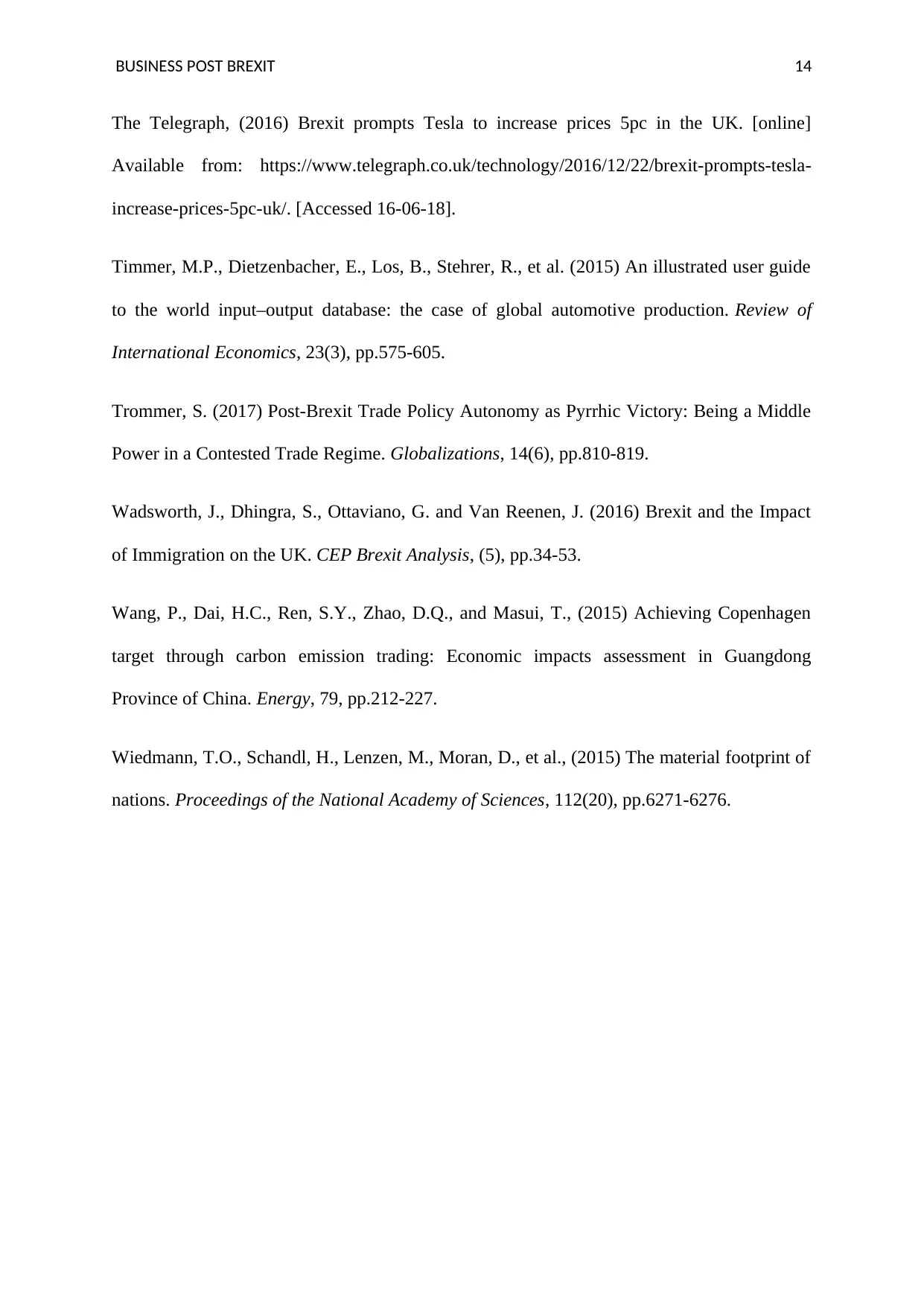
BUSINESS POST BREXIT 14
The Telegraph, (2016) Brexit prompts Tesla to increase prices 5pc in the UK. [online]
Available from: https://www.telegraph.co.uk/technology/2016/12/22/brexit-prompts-tesla-
increase-prices-5pc-uk/. [Accessed 16-06-18].
Timmer, M.P., Dietzenbacher, E., Los, B., Stehrer, R., et al. (2015) An illustrated user guide
to the world input–output database: the case of global automotive production. Review of
International Economics, 23(3), pp.575-605.
Trommer, S. (2017) Post-Brexit Trade Policy Autonomy as Pyrrhic Victory: Being a Middle
Power in a Contested Trade Regime. Globalizations, 14(6), pp.810-819.
Wadsworth, J., Dhingra, S., Ottaviano, G. and Van Reenen, J. (2016) Brexit and the Impact
of Immigration on the UK. CEP Brexit Analysis, (5), pp.34-53.
Wang, P., Dai, H.C., Ren, S.Y., Zhao, D.Q., and Masui, T., (2015) Achieving Copenhagen
target through carbon emission trading: Economic impacts assessment in Guangdong
Province of China. Energy, 79, pp.212-227.
Wiedmann, T.O., Schandl, H., Lenzen, M., Moran, D., et al., (2015) The material footprint of
nations. Proceedings of the National Academy of Sciences, 112(20), pp.6271-6276.
The Telegraph, (2016) Brexit prompts Tesla to increase prices 5pc in the UK. [online]
Available from: https://www.telegraph.co.uk/technology/2016/12/22/brexit-prompts-tesla-
increase-prices-5pc-uk/. [Accessed 16-06-18].
Timmer, M.P., Dietzenbacher, E., Los, B., Stehrer, R., et al. (2015) An illustrated user guide
to the world input–output database: the case of global automotive production. Review of
International Economics, 23(3), pp.575-605.
Trommer, S. (2017) Post-Brexit Trade Policy Autonomy as Pyrrhic Victory: Being a Middle
Power in a Contested Trade Regime. Globalizations, 14(6), pp.810-819.
Wadsworth, J., Dhingra, S., Ottaviano, G. and Van Reenen, J. (2016) Brexit and the Impact
of Immigration on the UK. CEP Brexit Analysis, (5), pp.34-53.
Wang, P., Dai, H.C., Ren, S.Y., Zhao, D.Q., and Masui, T., (2015) Achieving Copenhagen
target through carbon emission trading: Economic impacts assessment in Guangdong
Province of China. Energy, 79, pp.212-227.
Wiedmann, T.O., Schandl, H., Lenzen, M., Moran, D., et al., (2015) The material footprint of
nations. Proceedings of the National Academy of Sciences, 112(20), pp.6271-6276.
1 out of 15
Related Documents
Your All-in-One AI-Powered Toolkit for Academic Success.
+13062052269
info@desklib.com
Available 24*7 on WhatsApp / Email
![[object Object]](/_next/static/media/star-bottom.7253800d.svg)
Unlock your academic potential
© 2024 | Zucol Services PVT LTD | All rights reserved.





